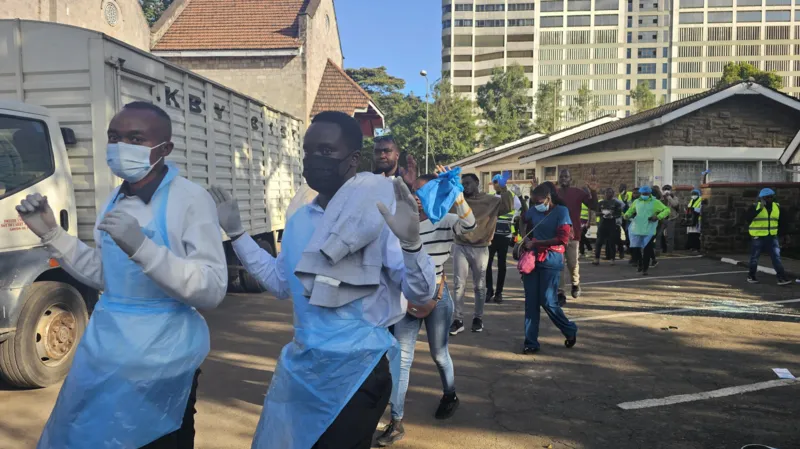
In a dramatic turn of events, protests against new tax proposals in Kenya erupted into violence on Tuesday, resulting in the deaths of at least five protesters and the partial destruction of the parliament building in Nairobi. The demonstrations, which have been ongoing for days, escalated significantly as members of parliament passed an amended finance bill that has been widely criticized for its proposed tax increases.
An enraged crowd, driven by frustration over the controversial bill, broke through police lines and stormed the parliament. Once inside, they vandalized the interior and set parts of the complex on fire. The ceremonial mace, a symbol of legislative authority, was stolen amidst the chaos. The Kenya Medical Association confirmed that police responded with live ammunition, resulting in the fatalities.
President William Ruto addressed the nation on Tuesday evening, condemning the violence and vowing to restore order. He described the protesters as "dangerous criminals" and announced the deployment of the military to assist in quelling the unrest. "It is not in order or even conceivable that criminals pretending to be peaceful protesters can reign terror against the people, their elected representatives, and the institutions established under our constitution and expect to go scot-free," Ruto declared. He pledged that all means would be used to thwart any attempts to undermine the country's security and stability.
The protests stem from widespread dissatisfaction with the new finance bill, which includes several tax hikes that many Kenyans view as burdensome. Despite some amendments to the original proposal, the public has demanded the bill's complete withdrawal. Demonstrators argue that the tax increases will exacerbate the economic hardships faced by many citizens.
The violent clashes left hundreds injured, with reports of rubber bullets and tear gas being used by the police. Temporary medical units were set up at a cathedral in Nairobi and outside the emergency unit at Kenyatta National Hospital to tend to the injured. The UN Secretary-General, Antonio Guterres, expressed deep sadness over the deaths and injuries, including those of journalists and medical personnel. He called on Kenyan authorities to exercise restraint and urged all demonstrations to remain peaceful.
Former President Uhuru Kenyatta also weighed in on the situation, urging the current leadership to engage in dialogue. "Kenya's leaders should know that power and authority are donated to them by the people," Kenyatta stated. His call for dialogue highlights the need for a peaceful resolution to the crisis, emphasizing the importance of listening to the citizens' grievances.
The protests have captured international attention, with notable figures such as Ugandan opposition leader Bobi Wine and South African politician Julius Malema expressing support for the demonstrators. Western countries have also voiced concern over the violence and called for calm.
Among the protesters, there is a sense of determination and urgency. Maureen Awuor, a 23-year-old demonstrator, emphasized the importance of their voices being heard. "Our voice must be heard... We are the generation that is coming up, so they need to hear us," Awuor said, reflecting the sentiments of many young Kenyans who feel marginalized by the current economic policies.
As the situation continues to unfold, the Kenyan government faces mounting pressure to address the public's concerns and find a way to restore peace and stability. The escalation of these protests serves as a stark reminder of the powerful impact of public dissent and the need for responsive governance.











